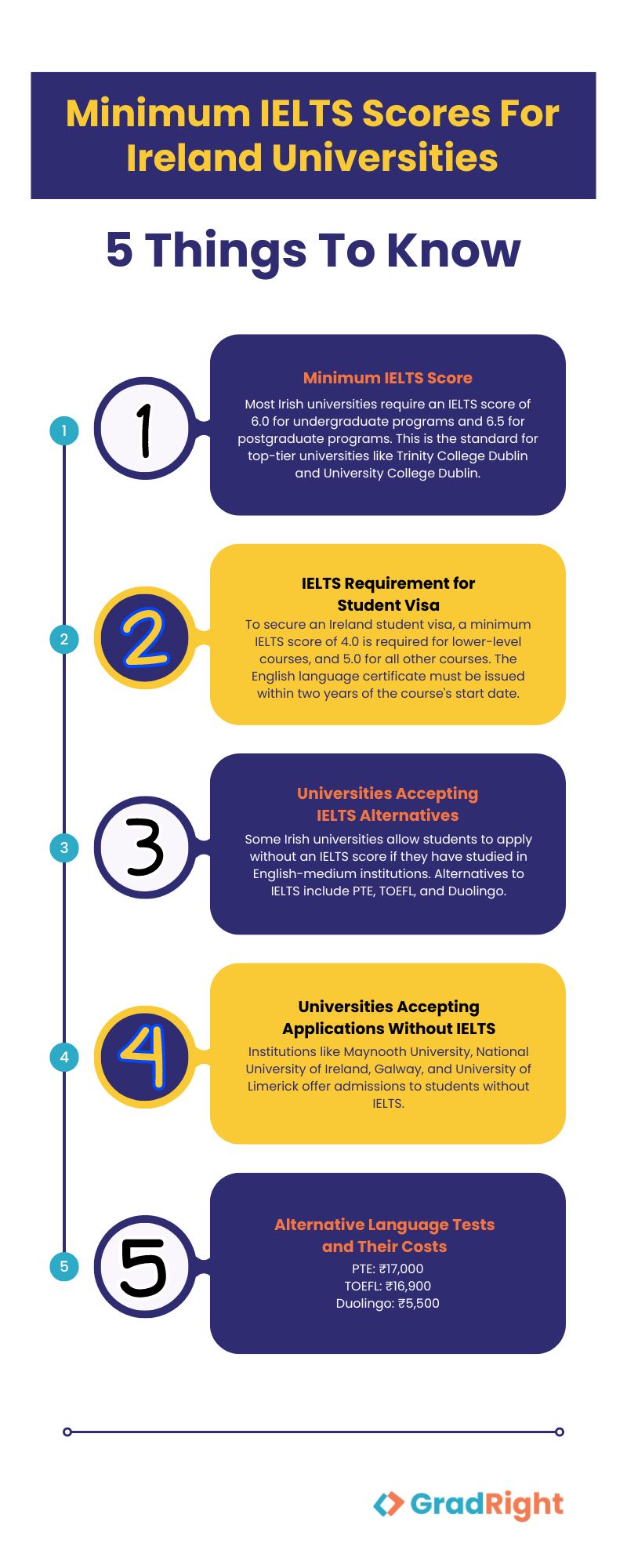Ireland offers Indian students a unique combination of academic excellence and cultural richness. For students planning to study in Ireland, the IELTS test is required.
IELTS is a test of English language proficiency for international students from non-native English language speakers seeking admission to universities in English-speaking countries.

Most Irish universities require a minimum overall IELTS band score of 6.0 to 6.5. However, the specific requirements can vary depending on the university and the program of study. Your IELTS score is crucial for obtaining an admission and study visa to pursue your academic goals in Ireland.
This article provides information on the minimum IELTS score for Ireland and other important aspects to consider.

Also Read: Study Abroad Guide for Indian Students 2024
IELTS Score for Ireland: Minimum IELTS Score To Study in Ireland Universities
The IELTS test is widely accepted by Irish universities as a measure of English language proficiency.
Here is the table based on the QS World University Rankings 2024 for Ireland’s top universities, and their IELTS requirements:
|
Rank |
University |
Global Rank |
IELTS Requirement (Undergraduate) |
IELTS Requirement (Postgraduate) |
|
1 |
Trinity College Dublin |
81 |
6.5 |
6.5 |
|
2 |
University College Dublin |
171 |
6.5 |
6.5 |
|
3 |
University of Galway |
289 |
6.5 |
6.5 |
|
4 |
University College Cork |
292 |
6.5 |
6.5 |
|
5 |
University of Limerick |
426 |
6.5 |
6.5 |
|
6 |
Dublin City University |
436 |
6.5 |
6.5 |
|
7 |
Maynooth University |
801-850 |
6.5 |
6.5 |
|
8 |
Technological University Dublin |
851-900 |
6.0 |
6.0 |
So, most top-tier Irish universities set a minimum IELTS score of 6.0 for undergraduate applicants and 6.5 for postgraduate applicants.
Also Read: Study Abroad Guide for Indian Students 2024
Minimum IELTS Score Required to Secure an Ireland Student Visa
The minimum English language requirement for visa purposes is IELTS 4.0 and 5.0 (specific minimum English language standard required for your course will likely differ). Your English language certificate must have been issued within two years of your course’s anticipated start date.
Note that applicants for English language courses aren’t obligated to submit a test provider certificate with their application unless it is specifically asked by the visa officer.
You can also offer Pearson, TOEFL, and other test scores for visa purposes.
Here is a comprehensive table and required scores:
|
Test Provider |
Minimum Standard for 2nd Level/Foundation Level/Preparatory English Courses |
Minimum Standard for All Other Courses |
|
International English Language Testing System (IELTS) Academic |
4.0 |
5.0 |
|
Pearson Test of English (PTE) Academic |
30 |
30 |
|
Test of English as a Foreign Language (TOEFL iBT), including TOEFL iBT At Home Edition |
47 |
61 |
|
Cambridge English Language Assessments (CELA) |
Pass in Preliminary English Test |
Pass in First Certificate in English (FCE), Cambridge English: Advanced (CAE), Cambridge English: Proficiency (CPE), Business English Certificate (Higher or Vantage) |
|
Duolingo English Test |
55 |
75 |
|
Oxford Test of English |
81 |
100 |
Now that you’ve got the minimum IELTS score for Ireland, let’s also explore the other side of the coin. What if you didn’t take the IELTS at all?
Also Read: IELTS Exam Dates 2024 in India: All Important Dates
Study in Ireland Without IELTS? Is it Possible?
The biggest obstacle to overcome to study abroad is to get a good IELTS score.
Taking an exam, and moreover, a language test can be overwhelming and intimidating for a number of students. Hence, it is only natural for students to look for a simpler alternative.
So here’s some good news – It is possible to study in Ireland without IELTS.
There are a few Irish universities accepting international students without the IELTS score or providing them with an alternate test choice.
How to study in Ireland Without IELTS?
It is common in most Irish universities to offer admissions to students without an IELTS score if the students have passed out from institutes with English as a medium of instruction and educational transaction.
In such cases, students need to provide a certificate from the previous institute proving that their education was in English.
Other than submitting the English certificate, the alternatives to the IELTS exam are PTE, TOEFL and Duolingo language proficiency tests.
Aspirants who want to study in Ireland without IELTS can take up these tests too:
PTE exam is one of the shortest exams that measures four skills – listening, speaking, reading, and writing in just two hours. Students over the age of 16 are eligible for this exam. The cost of the PTE exam is ₹17,000.
The TOEFL exam also tests your ability to listen, speak, read and write, especially in a classroom setting. This exam costs about ₹16,900.
Duolingo also offers English proficiency scores by means of adaptive testing and video interviews. It measures the candidates’ ability to listen, speak, read and write. The cost of the exam is ₹5,500 for a 45 minute test. It can also be taken twice a month.
Duolingo is a comparatively easy test and cheaper but has a limited number of universities accepting its test score. So, ensure that you are taking the test your desired college accepts.
For a better understanding of the score equivalent of these language proficiency exams to IELTS, look at the table below:
|
IELTS Band |
Equivalent scores |
|
5 |
TOEFL: 45 Duolingo: 75 PTE: 55 |
|
5.5 |
TOEFL: 60 Duolingo: 85 PTE: 60 |
|
6 |
TOEFL: 80 Duolingo:95 PTE: 65 |
|
6.5 |
TOEFL: 92 Duolingo:105 PTE: 70 |
|
7 |
TOEFL: 100 Duolingo: 105 PTE: 75 |
|
7.5 |
TOEFL: 105 Duolingo: 125 PTE: 80 |
With the above-mentioned language proficiency exams, you can apply to universities in Ireland without IELTS. Here are some of the universities:
- Maynooth University
- National University of Ireland, Galway
- University of Limerick
- Royal College of Surgeons in Ireland
- University College Cork
How to Apply Without IELTS to Ireland?
To apply to Ireland universities without IELTS, you can always start by shortlisting a number of universities exempting the IELTS scores, their ranks, and the courses they provide on their respective websites.
- While applying to any of the universities, you will be asked to appear for an online test or video interview to test your English language proficiency.
- This is the moment where you showcase your English verbal, communication/conversation skills.
- Clearing this interview will confirm your admission to an Irish university without the IELTS score. However, not all universities offer this option.
Various international student scholarships are available in Ireland, and students can apply for them if they fit the eligibility criteria.
Now that we are aware of the minimum scores required for Ireland universities, let us find out how we can study in Ireland without IELTS.
You can prepare for the IELTS exam with the help of these books:
- The Cambridge Official Guide to IELTS
- Cambridge IELTS 14 Academic Student’s Book with Answers with Audio
- Baron’s IELTS Superpack
Tips on Getting a Good IELTS Score:
Here are some simple and effective tips to help you achieve a good score on the IELTS exam.
The IELTS test has four sections: Listening, Reading, Writing, and Speaking. The Listening and Speaking sections are the same for everyone, but the Reading and Writing sections differ between the General and Academic tests. Make sure you know which version of the test you are taking and what to expect on test day.
- Practice Listening to Different Accents
The Listening section requires understanding British accents. To prepare, listen to podcasts, and watch movies, or newscasts. This will help you understand various pronunciations. - Improve Your Spelling
In the Listening section, spelling matters a lot. Even if you understand the word, you won’t get points if you spell it incorrectly. Practice spelling and be consistent with using UK spelling. - Enhance Your Reading Skills
For the Reading section, practice techniques like skimming (quickly finding the main ideas) and scanning (looking for specific information). Work on speed reading, as this will help you manage your time during the test. - Focus on Writing Structure
In the Writing section, your essay structure is important. You also have to use perfect grammar and vocabulary. Make sure you can organize ideas clearly and expand on them. - Practice Speaking Regularly
To prepare for the Speaking section, practice speaking English as much as possible. Record yourself answering questions with immense focus on speaking clearly. Use a wide range of vocabulary and try to sound natural. - Take Practice Tests
Simulate the test conditions by taking practice tests with a timer. This will help you get used to the time limits and reduce stress during the test. - Learn from Your Mistakes
After practice tests, review your mistakes carefully. Understand why you made them and how to avoid them in the future. - Expand Your Vocabulary
A good vocabulary is key to success in IELTS. Learn synonyms and academic words, especially for the Reading and Writing sections. Practice paraphrasing to express ideas in different ways.
To score well on the IELTS score for Ireland, focus on developing your skills and maintain a confident and relaxed attitude during the exam.
The registration fee for the IELTS exam in India is ₹17,000.
Also Read: IELTS Exam Pattern in 2024: Latest & Updated
How SelectRight simplifies your study in Ireland
SelectRight is an innovative platform that streamlines the university and program selection for students looking to study in Ireland. With a unique AI-driven algorithm, it analyzes over 8 million data points from 40,000 programs to match you with the best options based on your profile. This removes the guesswork, ensuring you apply to universities where you are likely to gain admission.
How SelectRight works:
- Create a free profile on SelectRight.
- Provide your academic background, test scores, and preferences.
- The algorithm generates a shortlist of suitable universities and programs.
- Compare options based on criteria such as alumni networks and faculty quality.
- Access expert advisors for assistance throughout the application process.
- Connect with peers and alumni from your shortlisted universities to make informed decisions.
Visit SelectRight today and find your perfect course and college match for the 2025 intake.
After securing a good IELTS score, your next step is to consider how you’ll fund your education in Ireland. The costs can add up quickly, from tuition fees to living expenses. While scholarships can help, most students still need an education loan to cover the full cost of studying abroad.
That’s where FundRight comes in. FundRight is a platform designed to simplify the education loan process for Indian students. Instead of manually researching and applying to multiple lenders, FundRight allows you to receive competitive loan offers from top lenders, including public banks and international NBFCs.
Here’s how FundRight works:
- Set up your profile on FundRight with your financial and academic details.
- Lenders will review your profile and submit their best loan offers.
- Compare these offers based on interest rates, repayment terms, and additional benefits.
- Get personalized advice from financial experts to help you choose the best loan.
- Finalize your loan and have the funds disbursed directly to your university.
By using FundRight, you can potentially save a significant amount on your loan, thanks to lower interest rates and better terms. This ensures that you focus on your studies in Ireland, rather than worrying about financing them. Get started with FundRight today and secure the best loan for your education in Ireland.
Frequently Asked Questions
1. What is the minimum IELTS score for Ireland universities?
The IELTS score to study in Ireland differs according to university and course type. However, having an IELTS band of 5.5 and above is the ideal score.
2. Are IELTS scores compulsory to apply for a visa in Ireland?
IELTS scores are mandatory for most universities in Ireland and applying for a visa.
3. Can I study in Ireland without IELTS or any other language proficiency exam?
Unfortunately, no non-native English speaker can study in Ireland without IELTS or any of its equivalents.
4. What are some of the alternative options to IELTS for studying in Ireland?
TOEFL, PTE and Duolingo scores are the alternative tests to study in Irish universities. Candidates who have passed the Cambridge Proficiency tests can also apply to certain universities.
5. How long does it take for an offer letter to arrive after applying to Ireland?
It takes around two working weeks for the universities in Ireland to respond with an offer letter after applying.


















